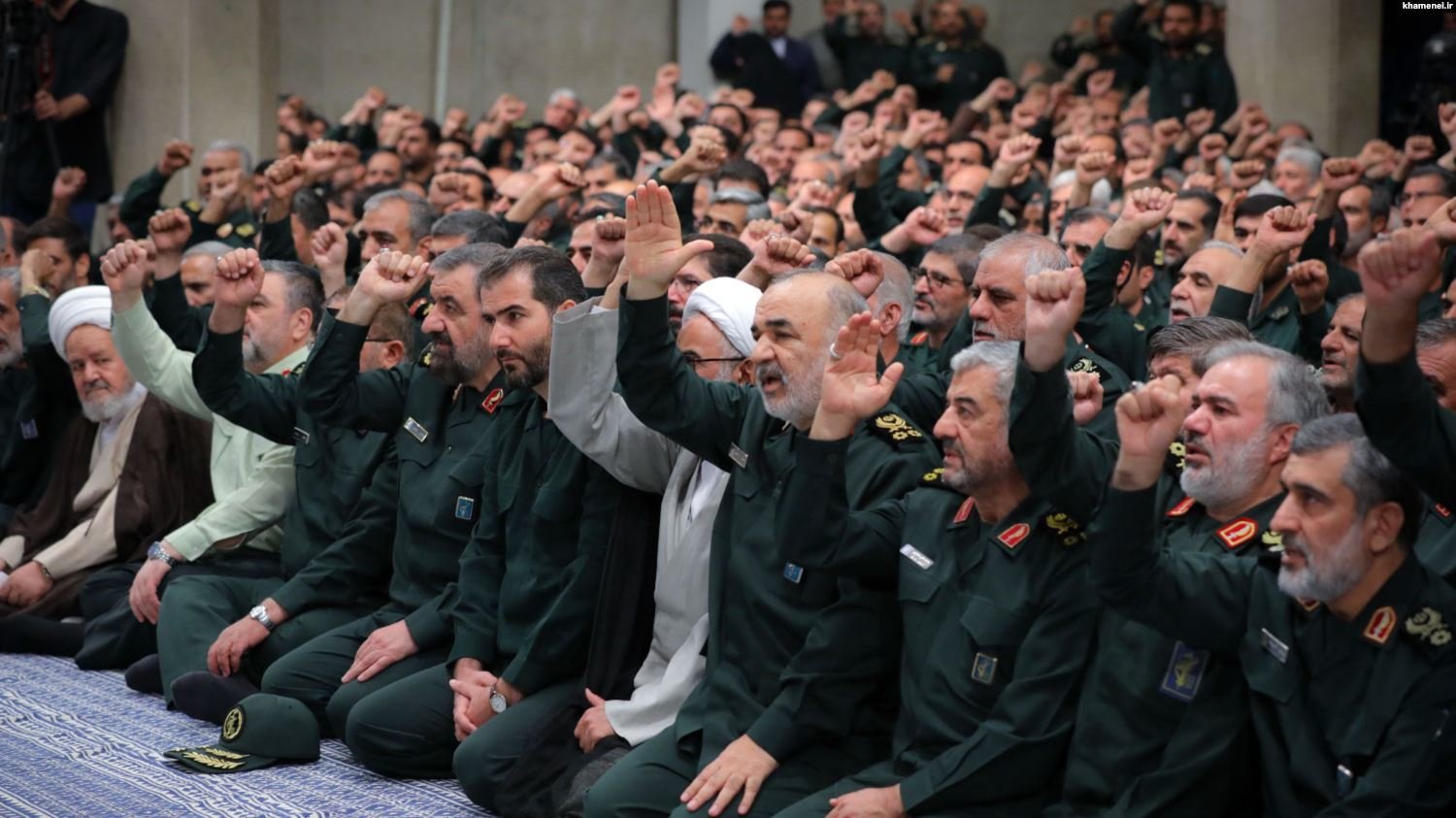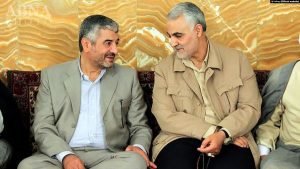A Rare Admission Of Past Tensions, Opposition Sympathies Among Iran’s Revolutionary Guards

IRGC commanders, in a meeting with Supreme Leader Ayatollah Ali Khamenei in February, have in the past supported various groups opposing the leaders of the clerical regime. Photo courtesy of kahmenei.ir
This article was originally published Oct. 5, 2020 on Radio Free Europe/Radio Liberty.
By Golnaz Esfandiari
In a rare acknowledgement of past divisions within Iran’s armed forces, a senior commander in the powerful Islamic Revolutionary Guards Corps (IRGC) has shone further light on a decade-old dispute that reached the highest echelons.
Speaking on state television, Mohammad Jafar Assadi said the late Quds Force commander, Qasem Soleimani, failed a decade ago to convince a fellow officer to abandon support for the country’s opposition Green Movement.
Assadi is a deputy commander of Iran’s unified military headquarters and a former IRGC ground forces commander.
Soleimani was assassinated in a U.S. drone attack in Baghdad in January, prompting an Iranian missile flurry aimed at an Iraqi base that housed international troops and further cinched up regional tensions.
The Green Movement took on major proportions after a disputed presidential election in 2009 sparked massive street protests and a deadly crackdown by Iran’s clerical leadership that included disappearances, thousands of detentions, and televised mass trials of prominent critics.
Assadi said Soleimani had done all he could but that the unnamed IRGC official, a veteran of the 1980-88 Iran-Iraq War, was unconvinced by Soleimani’s argument.
He described the other party as “someone who had rolled over to the other side during the [2009] sedition,” a term that Iranian officials use to refer to the mass street protests after hard-line President Mahmud Ahmadinejad’s reelection.
“Around midnight,” Assadi recalled, “I saw [Soleimani] and asked him whether he had seen the letter by ‘so and so,’ [and] he said he had not but had heard about it.”
“Until 2 a.m., we sat and talked. He said, ‘It’s a pity, we [fought] on the front lines with him,'” he quoted Soleimani as saying. “God knows how hard he tried. But [his counterpart] did not [change his mind].”
Out With The Old
It has been a decade since then-IRGC commander General Mohammad Ali Jafari first acknowledged publicly that some members had been supportive of the Green Movement that was brutally suppressed by the IRGC and other arms of the establishment.
Jafari, who led the IRGC from 2007 until 2019, said at the time that it was better to persuade members who supported the opposition that they were wrong than to eliminate them.
He didn’t reveal any names or ranks, but it was seen as a glimpse behind the curtains of a normally secretive organization.

Some IRGC members, including first-generation officials, were said to have expressed support for opposition figures Mir Hossein Musavi and Mehdi Karrubi, both of whom lost the 2009 presidential election to Ahmadinejad amid allegations of fraud.
Both Musavi and Karrubi, along with Musavi’s wife, university professor Zahra Rahnavard, were placed under house arrest in 2011 for challenging the establishment over the election and criticizing human rights abuses.
Saeid Golkar, an assistant political-science professor at the University of Tennessee at Chattanooga and a senior fellow on Iran policy at the Chicago Council on Global Affairs, said that the clerical establishment had subsequently intensified its efforts to replace the IRGC’s first and second generations dating back to the 1979 revolution.
Golkar said the IRGC, which controls Iran’s missile program and Tehran’s regional proxy efforts, is constantly being purged to ensure that members remain committed to Supreme Leader Ayatollah Ali Khamenei and his hard-line agenda. Khamenei, Iran’s highest authority, appoints the IRGC’s top commanders.
“By replacing these earlier generations, Khamenei has enhanced Guards loyalty, though of course even some members of the third generation are more opportunistic and less ideological,” said Golkar, author of the book Captive Society: The Basij Militia And Social Control In Post-Revolutionary Iran.
Consolidating Power
Tensions have reportedly simmered within the IRGC since the 1980-88 war with Iraq and beyond, including during the 1997 election of reformist President Mohammad Khatami. A significant portion of IRGC members were thought to have voted for Khatami instead of his rival, Ali Akbar Nategh Nuri, who was said to be Khamenei’s preferred candidate. Several IRGC members, including co-founder Mohsen Sazegara, who lives in exile in the United States, became critics of the establishment and supporters of reforms.
Golkar said that in order to maintain control over the IRGC, Khamenei and his allies use a combination of indoctrination, but also surveillance and coercion.
“Even right now, there are IRGC members who are leaning toward reform and some who are more critical toward the regime. But they formed a very small percentage of the IRGC, consisting of 180,000 personnel in different branches, and usually are in the middle and lower ranks, without any power to change the game,” Golkar added.
The IRGC’s power and influence has been growing in Iran amid reports that several former Guards commanders could run in next year’s presidential vote, which could contribute to a unification of power in the Islamic republic.
Parliament is currently controlled by conservatives and hard-liners, including more than 20 former IRGC and Basij volunteer-corps officials, namely its speaker, Mohammad Baqer Qalibaf, who is a former commander of the IRGC’s air force.
Copyright (c)2020 RFE/RL, Inc. Reprinted with the permission of Radio Free Europe/Radio Liberty, 1201 Connecticut Ave NW, Ste 400, Washington DC 20036.

RFE/RL's mission is to promote democratic values by providing accurate, uncensored news and open debate in countries where a free press is threatened and disinformation is pervasive. RFE/RL reports the facts, undaunted by pressure.
RFE/RL is registered with the IRS as a private, nonprofit Sec. 501(c)3 corporation, and is funded by a grant from the U.S. Congress through the United States Agency for Global Media (USAGM) as a private grantee. All major policy determinations governing RFE/RL operations are made by RFE/RL's Board of Directors. RFE/RL's editorial independence is protected by U.S. law.
BRCC and Bad Moon Print Press team up for an exclusive, limited-edition T-shirt design!
BRCC partners with Team Room Design for an exclusive T-shirt release!
Thirty Seconds Out has partnered with BRCC for an exclusive shirt design invoking the God of Winter.
Lucas O'Hara of Grizzly Forge has teamed up with BRCC for a badass, exclusive Shirt Club T-shirt design featuring his most popular knife and tiomahawk.
Coffee or Die sits down with one of the graphic designers behind Black Rifle Coffee's signature look and vibe.
Biden will award the Medal of Honor to a Vietnam War Army helicopter pilot who risked his life to save a reconnaissance team from almost certain death.
Ever wonder how much Jack Mandaville would f*ck sh*t up if he went back in time? The American Revolution didn't even see him coming.
A nearly 200-year-old West Point time capsule that at first appeared to yield little more than dust contains hidden treasure, the US Military Academy said.












